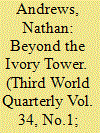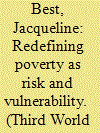|
|
|
Sort Order |
|
|
|
Items / Page
|
|
|
|
|
|
|
| Srl | Item |
| 1 |
ID:
116897


|
|
|
|
|
| Publication |
2013.
|
| Summary/Abstract |
International Relations ( ir ) scholars and students are often presented with four (sometimes five) 'great debates' that characterise the 'state of the discipline'. However, Robert Cox's 1981 article in Millennium simplified the discussion into two binaries: problem-solving theory vs critical theory. While this configuration has been influential, it has inhibited the reflexivity, complexity, as well as the multidisciplinary nature of the discipline. This paper moves beyond this problematic simplification to construct a 'third way', which borrows from both rationalist and critical approaches to craft a somewhat distinct niche in ir theory. It calls for the dual goal of deconstruction and reconstruction. With this approach I seek to show the mutually constitutive synergies between knowledge/theory and practice, and to expatiate on the argument that theory is indeed always for someone and for some purpose, whether such normative underpinnings are latent or manifest.
|
|
|
|
|
|
|
|
|
|
|
|
|
|
|
|
| 2 |
ID:
116894


|
|
|
|
|
| Publication |
2013.
|
| Summary/Abstract |
Natural resource rents, development assistance and unrequited foreign exchange inflows such as remittances relax the balance of payments constraint on economic growth. The failure of some governments to translate these resources into successful development has been attributed to an affliction called 'Dutch disease', or, more ominously, to a 'curse' associated with the availability of natural resources. This paper examines the disease/curse analysis and rejects it in favour of a political economy explanation of the problems associated with resource use. We argue that conventional analysis of resource-rich countries is misleading because its various manifestations are based on inappropriate assumptions and flawed logic. In practice the 'curse' and the 'disease' are outcomes of policy decisions, rather than manifestations of deep structural weaknesses, and they are more likely to be suffered in countries whose governments pursue neoliberal economic policies.
|
|
|
|
|
|
|
|
|
|
|
|
|
|
|
|
| 3 |
ID:
116895


|
|
|
|
|
| Publication |
2013.
|
| Summary/Abstract |
Contemporary globalisation is characterised by an explosion of organisational pluralism. Acronyms such as brics (Brazil, Russia, India, China and South Africa), ibsa (India, Brazil and South Africa), and basic (Brazil, South Africa, India and China) abound. This proliferation of groupings signals a repositioning within global governance and their names serve as metaphors for adjustments among formal and informal modes of global governance. They may be understood in terms of global bricolage: a framework for analysing incipient assemblages in global governance. Rooted in cultural political economy, this notion offers a language for grasping a loose meshwork of groupings based on certain large countries in the global South. The concept of global bricolage deepens analysis of polycentric governance and enables observers to identify three major tensions that mark contemporary global order. The antinomies are between old and new narratives that represent actual or potential shifts in prevailing forms of global governance, between an emancipatory spirit and contested neoliberal norms, and between interregional coalitions and intraregional differences. Quite clearly, the manner of addressing them will bear greatly on the shape of future world order.
|
|
|
|
|
|
|
|
|
|
|
|
|
|
|
|
| 4 |
ID:
116898


|
|
|
|
|
| Publication |
2013.
|
| Summary/Abstract |
Livelihoods approaches emerged from a broad range of efforts to understand how people live in particular places. They have since cohered into often instrumentally applied frameworks that rest on the broadly held assumption that livelihoods are principally about the management of one's material circumstances. This assumption limits the explanatory power of livelihoods approaches by shifting a range of motivations for livelihoods decisions outside the analytic frame. This article extends efforts to recover a broader lens on livelihoods decisions and outcomes by conceptualising livelihoods as forms of intimate government, local efforts to shape conduct to definite, shifting, and sometimes contradictory material and social ends. By employing a Foucault-inspired analytics of government to the study of livelihoods in Ghana's Central Region, the paper presents a systematic, implementable approach to the examination of livelihoods and their outcomes in light of this reframing, one where material outcomes are one of many possible ends of intimate government, instead of the end. By opening the analytic lens in this manner, we can explain a much wider set of livelihoods outcomes and decisions than possible under contemporary approaches.
|
|
|
|
|
|
|
|
|
|
|
|
|
|
|
|
| 5 |
ID:
116903


|
|
|
|
|
| Publication |
2013.
|
| Summary/Abstract |
One of Pfizer Pharmaceutical's general corporate goals is that no person anywhere should be restricted from receiving essential and affordable medicines. From 2009 to 11 Pfizer's internal corporate social responsibility (csr) programmes were private corporate efforts that were discretionary and limited in scope and impact. All Pfizer's csr preferred public policy governmental positions encompassed neoliberal government requirements based on market and profit considerations, with no positions demonstrating, in detail, how universal provision of drugs for all would be provided. Currently Pfizer's csr efforts represent a dichotomy when compared with the general corporate goal of not restricting essential and affordable medicines in order to provide medicines for all.
|
|
|
|
|
|
|
|
|
|
|
|
|
|
|
|
| 6 |
ID:
116902


|
|
|
|
|
| Publication |
2013.
|
| Summary/Abstract |
We routinely refer to pharmaceutical patents as intellectual property rights. The argument in this article is that pharmaceutical patents represent a 'bargain' between government, business and society. The pharmaceutical patent system constitutes a social institution with social goals that go well beyond solely providing incentives to proprietary pharmaceutical companies to develop innovative drugs. Therefore we need to assess this institution in terms of what is referred to here as its social effectiveness, that is, its ability to accomplish the social goals it was set up to achieve. Such assessment has to take into account the fact that the pharmaceutical patent system has now become global, a development that has made its social ineffectiveness more apparent and worrisome. The severity and gravity of unmet global and local public health needs compels urgent scrutiny of the pharmaceutical patent system, as well as of alternatives to it, such as prizes for pharmaceuticals.
|
|
|
|
|
|
|
|
|
|
|
|
|
|
|
|
| 7 |
ID:
116901


|
|
|
|
|
| Publication |
2013.
|
| Summary/Abstract |
Development thinking in the past two decades has explicitly embraced law as an engine of development. This legal turn has been accompanied by a dramatic expansion of efforts to measure and quantify legal systems. Against claims that legal indicators are neutral, technical descriptions of the legal world, this article argues that legal indicators do not merely reflect legal reality; their construction and deployment are central to the continuing diffusion of neoliberalism as development common sense. The article considers the two most prominent projects to quantify law in the service of economic development-the World Bank's Worldwide Governance Indicators and Doing Business indicators-and argues that these reproduce a narrow neoliberal conception of law as a platform for private business and entrepreneurial activity, and institutional support for a system of laissez faire markets.
|
|
|
|
|
|
|
|
|
|
|
|
|
|
|
|
| 8 |
ID:
116900


|
|
|
|
|
| Publication |
2013.
|
| Summary/Abstract |
The existence of global poverty poses a dilemma for liberal economic governance. Its persistence is an irritant to expert assertions that things will get better soon, making it necessary to develop new theories about the causes and nature of poverty and new strategies for managing and reducing it. This paper examines the most recent shift in how the World Bank and other organisations conceptualise and manage poverty, by beginning to view it through the lenses of social risk and vulnerability. The paper examines the evolution in how the Bank has historically sought to contend with the problem of poverty, and then considers the various expert debates and bureaucratic negotiations that shaped how this new conception of poverty as risk and vulnerability came to be institutionalised. Finally, I consider the implications of this shift for how the problem of poverty is governed, suggesting that it involves a much more dynamic ontology of poverty and requires the use of a more proactive set of techniques. While this more active intervention requires a more present and engaged state than was evident in the structural adjustment era, its role nonetheless remains constrained by the liberal preoccupation with limiting governmental power.
|
|
|
|
|
|
|
|
|
|
|
|
|
|
|
|
| 9 |
ID:
116896


|
|
|
|
|
| Publication |
2013.
|
| Summary/Abstract |
Classified by the UN as one of five core challenges to civilian protection, humanitarian access denial is an increasingly urgent dilemma facing humanitarian actors. Conventional thinking about humanitarian access denial focuses on its outcomes rather than factors that shape its occurrence. The norms associated with humanitarian access and civilian protection are highly institutionalised at the intergovernmental level, yet states demonstrate considerable variation in their compliance with them at the domestic level. Utilising an interpretivist approach, we analyse how actions taken by states to deny humanitarian access in Ethiopia, Sri Lanka and Darfur/Sudan are given meaning and how they come to be understood by state actors themselves as a conduit to pursue other goals. We propose a descriptive typology of humanitarian access denial, and discuss the implications this phenomenon carries for civilian protection by humanitarian actors.
|
|
|
|
|
|
|
|
|
|
|
|
|
|
|
|
|
|
|
|
|